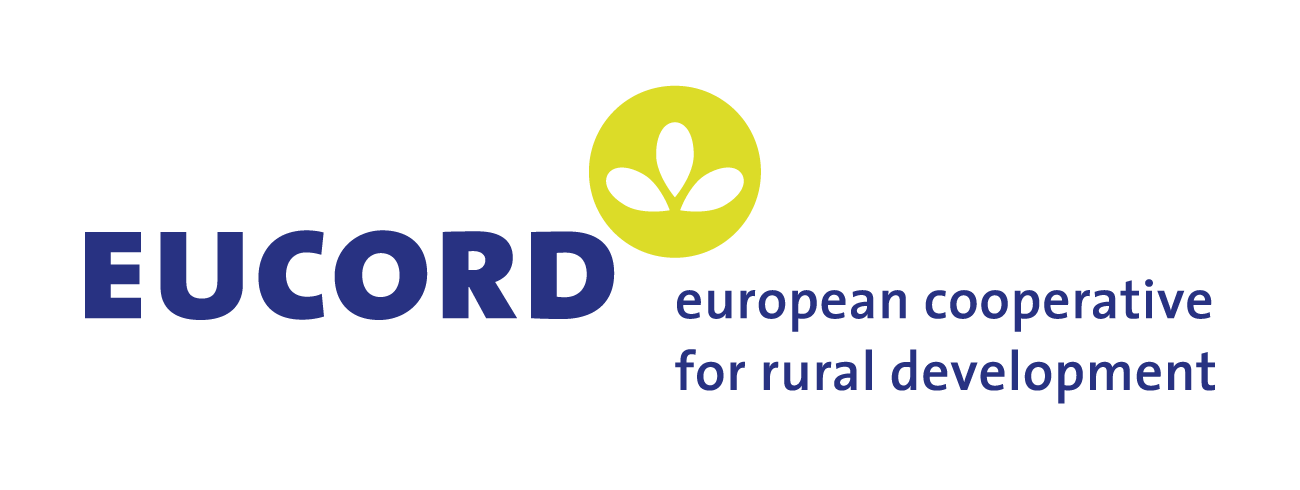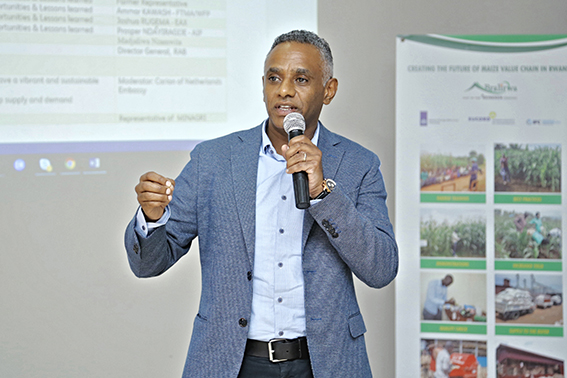Farmers made the appreciation following round-table discussions bringing together stakeholders in Maize value chain development in Rwanda. Organized by Bralirwa Plc, the discussions took place on 12th June 2019 at Dereva Hotel in Rwamagana district and coincided with the conclusion of the CREATE RWANDA PROJECT implemented between 2014-2019.
The meeting aimed at discussing challenges affecting farmers in maize production and sought ways of overcoming them.
Present at the event were officials from Bralirwa including the Managing Director, Merid Demissie, CREATE RWANDA representatives, Rwanda Agriculture Board (RAB), the Ministry of Agriculture, Netherlands Embassy, World Food Program and farmers among other stakeholders.
CREATE is a program of the European Cooperative for Rural Development (EUCORD funded by HEINEKEN International through its subsidiary Bralirwa Plc, Netherlands Ministry of Foreign Affairs and International Finance Corporation (IFC).
EUCORD has partnered with HEINEKEN and its subsidiary BRALIRWA to assist with the implementation of CREATE and limit dependency on imported maize in Rwanda.
Smallholder farmers were integrated into Bralirwa’s supply chain, trained in good agricultural practices in a bid to substitute imported raw materials and help to establish local supply chains, which transfer purchasing power from the urban middle class to the rural poor.
CREATE Rwanda’s activities started in the second half of 2014 and the first harvest took place during the first half of 2015.

Since then, the number of cooperatives has increased from 14 to 50. It currently has 40,000 direct beneficiaries.
Patricie Mukashema, a farmer and member of Twungubumwe cooperative based in Murundi sector of Kayonza district, beneficiary of CREATE Project said “With the advent of the project, we have shifted from subsistence to market-oriented agriculture.”
Twunge Ubumwe cooperative comprises of 27 members growing crops on 9 hectares. Mukashema said, at the beginning of the project, the cooperative used to harvest 2 tons per hectare but grew to 4.5 tons currently and hopes for increased yields.
Other support relates to the introduction of irrigation technologies, drying facilities helping to counter post-harvest losses.
With these efforts, Mukashema said, they currently grow crops three seasons of the year unlike the past when there were no efforts to mitigate climate change.
Agnes Umurerwa, a member of COHUNYA, a maize farmers’ cooperative in Kigabiro sector in Rwamagana cooperative said: “The project helped our cooperative to increase maize yields from 20 tons to 45 tons from 11 hectares in one season. We produce for the market and have enough reserves for home consumption. From maize farming earnings, I pay fees for three secondary school children.”
According to Andre Kanani, a member of Imbereheza Kabare from Kayonza district, members acquired enough skills in preservation and supplying quality produce which resulted in better quality harvests while prices rose from Rwf 120 to Rwf 240 and 260 per kg of maize. He said, the cooperative is planning to build its own maize mill.
The volume of maize sold to Minimex’ maize storage and drying facility of ProDev Rwanda Ltd has increased from 693 tons in 2015 to 4,718 tons in 2018 attributed to expanded cultivated area and maize productivity from less than 2.0 MT/ha to an average of 3.0 MT/ha.
ProDev Rwanda Ltd, is involved in the agriculture value chain that collects, stores and markets a range of produce including maize, beans and livestock feeds.

According to Fabien Ngoga, CREATE Project Coordinator, the target of supplying 3000 tons to Minimex was surpassed in two years with a current supply of 5000 tons.
ProDev and Minimex will take over the activities to ensure sustainability of the CREATE Project.
The funding of the CREATE PROJECT is in line with Heineken’s initiatives to support smallholder farmers and promoting local sourcing of raw materials. It complements the Bramin mechanized and irrigated maize farm based in Eastern Province. The latter is a joint venture between Bralirwa, the Heineken Group in Rwanda, and Minimex, the leading maize milling company in Rwanda.
It represents one of the first modern large scale maize farming enterprises in Rwanda.
A total of US $ 2 million was pumped in the project to boost maize yields in Rwanda.
Speaking to maize value chain stakeholders during the roundtable discussions, the Managing Director of Bralirwa, Merid Demissie said the company is working hard to impact the economy and promote local sourcing.
“With Heineken, we are trying to source raw materials locally from across the African continent. Heineken is trying to increase local sourcing of raw materials by 60% by the end of 2020 and we are on the right track. Here in Rwanda, we have Bramin farm, and we are putting a lot of effort to make sure that we promote it to the next level,” he affirmed.
Bralirwa MD called on stakeholders in the maize value chain to work together to turn challenges into opportunities and positive outcomes.
Following the roundtable discussions, eighteen maize farmers’ cooperatives from Eastern Province, beneficiaries of the CREATE RWANDA PROJECT were awarded for best performance in boosting maize productivity as well as expanding investment.
Awards were classified in three categories including cooperatives emerging the best in Quantity of Maize Supplied to MINIMEX, Boosting Maize Productivity, and Investment Value and Loan Management.
Awards ranged from weighing scale, sprayers, moisture meter and safety gloves while the overall best cooperative (ISUKA IRAKIZA) walked away with a shelling machine worth Rwf 4.5 million.
Other awarded cooperatives include COPAVABU, COCUMAKI, IMBERE HEZA KABARE, ABAKUNDANA, TWUNGUBUMWE, COHUNYA, ABANYAMURAVA, TWITEZIMBERE NYABOMBE, JYAMBERE MUHINZI and MURYAWETU.
Read this article and more in issue Number 100 of Hope Magazine
- BY HOPE MAGAZINE
- POSTED 28TH JUNE 2019


Leave a Reply